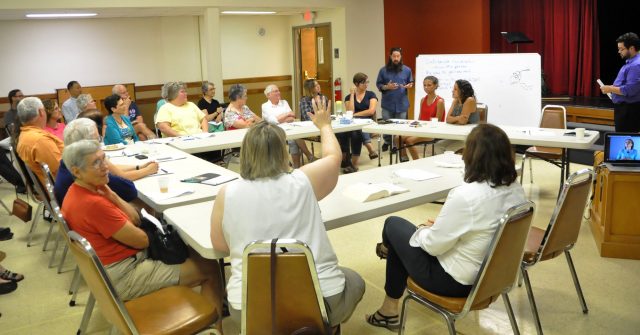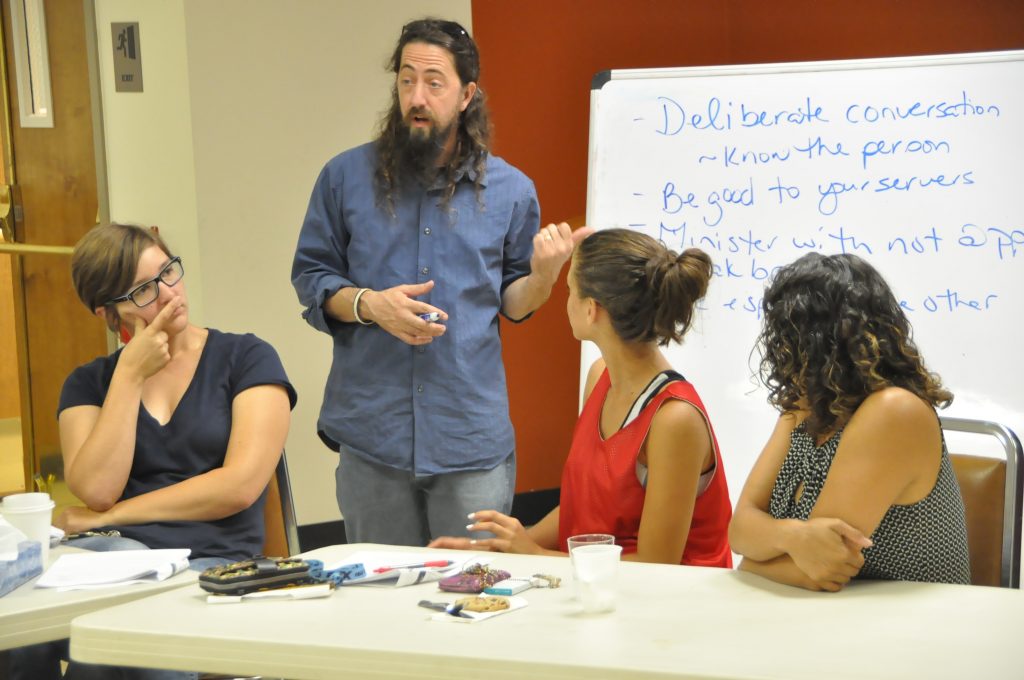The Eastern PA Conference has published three times the Northeastern Jurisdiction College of Bishops’ recent statement promising to work on dismantling racism, healing the pain of violence and oppression, and becoming effective peacemakers.
We have published their historic statement, delivered July 13 at the NEJ Conference in Lancaster, on our website, in our newspaper and, as requested of all annual conferences, in a local newspaper ad, which we purchased in the Philadelphia Tribune’s Sept. 22 edition.
Meanwhile, Bishop Peggy Johnson is promoting the Call to Action proposed by African American delegates and endorsed by the entire Jurisdictional Conference. That call urges all NEJ conferences to engage intentionally in ministries to develop African-American leaders and churches, and to work on removing systems and habits of racial bias, white privilege and institutional racism.
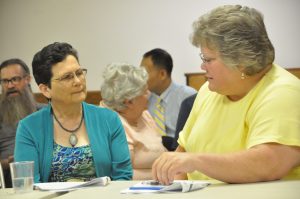 Bishop Johnson named the Call to Action as one of her main priorities for next year and the coming quadrennium. During her presentation to each district she called for: interracial dialogues, friendships and educational encounters; efforts to increase and support African American ordained ministry candidates; and a goal of to start a new, predominantly black, youth-focused congregation by 2020. In addition, her Cabinet received training from Eric Law’s Kaleidoscope Institute in September “so that Cabinet members might have more tools for this work.”
Bishop Johnson named the Call to Action as one of her main priorities for next year and the coming quadrennium. During her presentation to each district she called for: interracial dialogues, friendships and educational encounters; efforts to increase and support African American ordained ministry candidates; and a goal of to start a new, predominantly black, youth-focused congregation by 2020. In addition, her Cabinet received training from Eric Law’s Kaleidoscope Institute in September “so that Cabinet members might have more tools for this work.”
But the bishop knows that publishing episcopal manifestos and setting ambitious goals from on high will not end racism nor ensure racial progress, without redemptive change happening closer to the ground.
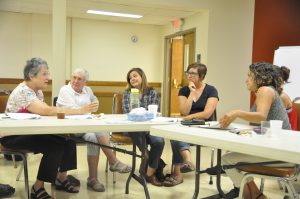 “Reconciliation cannot be addressed at a structural level until it has been embraced at a personal level, within your own heart,” she said, quoting Transitioning Your Church to Living Color by Mark DeYmaz & Bob Whitesel. “Only then will you be motivated and excited to pursue the biblical calling with others of a different ethnic or economic background.”
“Reconciliation cannot be addressed at a structural level until it has been embraced at a personal level, within your own heart,” she said, quoting Transitioning Your Church to Living Color by Mark DeYmaz & Bob Whitesel. “Only then will you be motivated and excited to pursue the biblical calling with others of a different ethnic or economic background.”
Several districts and churches are bringing people together to talk and learn about race relations and racial inequities. After an initial clergy dialogue in 2015, the Southwest District has been convening clergy and laity for regular, guided discussions since August 29, when nearly 40 attendees came from 15 churches.
Their stated goals are to engage participants in “Opening Conversations, Developing Relationships, and Working Towards Justice.” An interracial team of four pastors—the Revs. Jason Perkowski, Andrea Brown, Derrick Gutierrez and now Quentin Wallace—co-lead the effort, helping participants to share experiences, questions and often profound insights. Two have hosted dialogues with dinner at their churches. Anyone may attend.
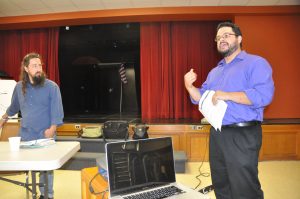 “Several people in the group are eager to do, not just talk,” said Perkowski after the Oct. 13 session. “But do what?” So he prepared a list of suggestions titled “Concrete Things Congregations Can Do to Promote Racial Justice.” Contact him for the list at jbperkowski@gmail.com. The Southwest District Racial Justice Dialogue ministry also has a Facebook page.
“Several people in the group are eager to do, not just talk,” said Perkowski after the Oct. 13 session. “But do what?” So he prepared a list of suggestions titled “Concrete Things Congregations Can Do to Promote Racial Justice.” Contact him for the list at jbperkowski@gmail.com. The Southwest District Racial Justice Dialogue ministry also has a Facebook page.
Meanwhile, the East District, which also sponsored a clergy dialogue in 2015, is now planning a more in-depth Conversations on Race Relations retreat, Jan. 20-21, for clergy and laity. Titled “Walk with the African American Experience,” the overnight retreat, hosted by Washington Crossing UMC, is mandatory for clergy members.
 Among churches, UM Church of the Open Door in Kennett Square hosts monthly race relations talks on second Thursdays, using “TED Talks on Race” videos as discussion-starters. On Nov. 10, participants will watch and discuss “A Prosecutor’s Vision for a Better Justice System,” a talk by Adam Foss, a young, black former prosecutor who now heads a nonprofit working to improve legal outcomes for juveniles.
Among churches, UM Church of the Open Door in Kennett Square hosts monthly race relations talks on second Thursdays, using “TED Talks on Race” videos as discussion-starters. On Nov. 10, participants will watch and discuss “A Prosecutor’s Vision for a Better Justice System,” a talk by Adam Foss, a young, black former prosecutor who now heads a nonprofit working to improve legal outcomes for juveniles.
It’s about taking personal responsibility, says Bishop Johnson, to embrace change on personal and then public levels. She suggests “sharing a meal to hear people’s hearts in their stories,” or sharing church facilities or a mission project with others who are different, or sharing pulpits and choirs for a Sunday. The key is in sharing experiences with others in order to “open wide one’s heart.”
If your church is, or plans to be, involved in improving racial understanding and race relations, please let us know, so we can report on it to encourage others. Contact us at
communications@epaumc.org.

